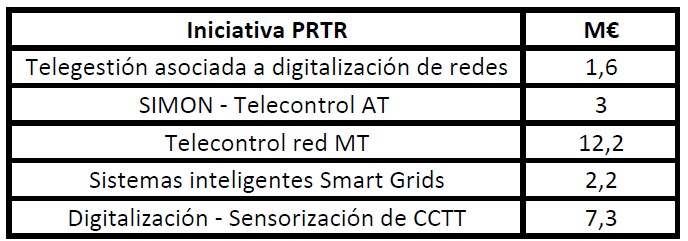Recovery, Transformation and Resiliency Plan 2021
With the help of the project named "Digitalización de las redes eléctricas" under Royal Decree 1125/2021, we are accelerating the digitization of our grid.
In 2021, we have proposed investments in projects eligible for co-financing by the European Union (50%) amounting to €62M within the Recovery, Transformation, and Resilience Plan in the section aimed at the Digitalization of electricity grids. Among other actions, we include investments in sensorization and advanced automation of the grid.
These investments allow us to move towards the digitalization of the grids and will enable us to achieve the ambitious goals that we have set ourselves as a country and as a society to achieve decarbonization.
Digitization of power grids in the National Recovery, Transformation and Resilience Plan (PRTR)
The National Integrated Energy and Climate Plan (PNIEC) establishes as objectives for the year 2030 that 42% of the final use of energy should come from renewable sources, as well as that 74% of electrical energy should also be of renewable origin.
Within this framework, electricity grids are a key axis in the achievement of these objectives. However, the grids need to be modernized and digitized. The digitalization of electricity distribution networks will facilitate the participation of users in the process of decarbonization of the electricity system, favoring the integration of renewables in the generation mix and, therefore, reducing the need for electricity production with potentially polluting sources, as well as contributing to promoting changes in mobility models.
Given the importance of electricity grids in the national energy transition defined by the PNIEC, within the Recovery, Transformation and Resilience Plan submitted to the European Commission, Component 8: 'Electricity infrastructures, promotion of smart grids and deployment of flexibility and storage' includes support for investment to achieve this necessary transformation of the grids.
In its Resolution of October 2024, the Secretary of State for Energy approved the payment of subsidies from the 2021 recovery, transformation, and resilience plan funds, in accordance with Royal Decree 1125/2021 of December 21. EDISTRIBUCIÓN REDES DIGITALES S.L.U. is recognized as receiving a payment of €26,179,160 for the investment made in the following PRTR initiatives:
Subvención recibida (Millones de €)

